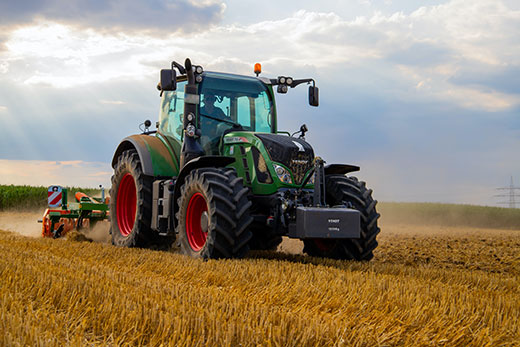
K-State's Tawnie Larson urges farmers to take steps to protect themselves from hot weather.
Cool Ideas: K-State expert urges farmers to follow safety tips on hot days
Light clothing, cooling vests should be part of safety equipment
June 16, 2023
K-State Research and Extension news service
MANHATTAN, Kan. – Summer’s hottest days are likely still ahead in Kansas, but Tawnie Larson knows that “farm and ranch work won’t stop during hot weather.”
So, Larson -- a project consultant for agriculture health and safety in Kansas State University’s Carl and Melinda Helwig Department of Biological and Agricultural Engineering – is putting in some sound advice for farmers this summer.
“Wear lightweight, long-sleeved, light-colored clothing, or a cooling vest and take short, frequent breaks in a shaded or cool area to stay cool while working outdoors,” Larson said.
She said that technical cooling vests “are essentially like wearing air conditioning.”
“The vests use specialized fabric and fibers to circulate cooling products to keep body temperatures low during hot days,” she said.
Larson also suggests using equipment with a canopy, such as a Rollover Protection Structure, known as ROPS, with a sunshade.
“Usually, the ROPS with canopies cannot be folded down, which in turn provides more safety for operators because the ROPS is always activated,” Larson said. “Equipment that has an enclosed cab often times comes with air conditioning and has a built-in ROPS. Both of these options provide safety from rollovers and can help prevent heat-related illness.”
Larson notes that each individual reacts to hot days different, so it’s important to listen to your body. “Take frequent breaks and stay inside during the hottest part of the day,” she said.
According to the Kansas Mesonet, the hottest part of the day in Kansas is between 3 p.m. and 6 p.m.
The U.S. Centers for Disease Control and Prevention recommends drinking 1 cup of water every 15-20 minutes, and before becoming thirsty. The CDC also recommends keeping sugary and alcoholic drinks to a minimum. Replace salt and minerals with snacks or a sports drink.
Heat stroke symptoms include high body temperature; hot, dry, red or damp skin; fast, strong pulse; headache; dizziness; nausea; confusion; and lack of consciousness. Larson said that if a person is suffering from heat stroke:
- Call 9-1-1 immediately.
- Move to the person to a cooler place.
- Lower the person’s temperature with cooler clothes.
Do not give the person anything to drink.
“Heat exhaustion is different and usually not as serious,” Larson said, noting that symptoms of exhaustion may include heavy sweating; cold, pale and clammy skin; fast, weak pulse; nausea; tiredness; headache; and fainting.
“If this occurs, take action by moving to a cool place, loosen clothing, get cool, sip water and seek medical attention if symptoms last longer than an hour or get worse,” Larson said.

